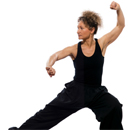 Have you ever considered using tai chi as your regular form of exercise? Tai chi originated from China in the 15th century by the Taoist priest, Zhang San Feng, for his practice of religion and philosophy. Two centuries later, tai chi evolved into an area of martial arts. Today, tai chi pertains to an exercise utilizing distinct movements that promote both physical, as well as psychological improvements. Tai chi is now used by millions of individuals around the world as a regular form of exercise to decrease the risk of obesity and to achieve weight loss.
Have you ever considered using tai chi as your regular form of exercise? Tai chi originated from China in the 15th century by the Taoist priest, Zhang San Feng, for his practice of religion and philosophy. Two centuries later, tai chi evolved into an area of martial arts. Today, tai chi pertains to an exercise utilizing distinct movements that promote both physical, as well as psychological improvements. Tai chi is now used by millions of individuals around the world as a regular form of exercise to decrease the risk of obesity and to achieve weight loss.
According to a recent report published in the journal Evidence-Based Complementary and Alternative Medicine, the results of an extensive review of research reports showed that tai chi is an effective exercise for both body and mind. Tai chi teaches the mind to move energy across the body using distinct slow movements.
Advertisement
How Tai Chi Impacts Your Risk of Obesity
The report described that individuals engaged in tai chi have experienced improvements in their quality of life. In addition, these tai chi exercise participants have also shown an enhancement of their general health, including that of achieving weight loss and decreasing the risk of obesity. But how exactly does tai chi work result in weight loss if this type of exercise only involves slow physical movements of the body? Reports have described that although tai chi makes use of slow and low-impact movements, the principle of this exercise involves both the body and mind, thus inducing a relaxation and a deeper focus on inner energies of the body. The amount of energy and body movements in tai chi is therefore equivalent to repeated movements associated with Western aerobic exercise for weight loss and decrease in risk of obesity.
The relaxation of the body and mind that results from tai chi also improves the emotional condition of an individual, thus decreasing the chances of a person to overeat, which in turn lowers the risk of obesity. It is also important to realize that individuals who are emotionally unstable turn to binge eating for comfort, thus increasing their risk of obesity and making weight loss less likely. It is also more difficult to achieve weight loss when an individual is emotionally disturbed and makes use of sweet or sugar-rich food items in pacifying one’s self during difficult times. This behavior has been strongly associated with a higher risk of obesity.
Better Mental Health and Weight Loss Benefits
Engaging in tai chi generally results in a stabilization of emotions and thus better mental health, significantly decreasing the risk of obesity and removing the need for weight loss. For other individuals using tai chi as exercise, the occurrence of body pain has also been shown to significantly decrease, thus increasing their mobility that may help in weight loss and lower the risk of obesity.
Advertisement
Can the elderly engage in tai chi exercise, too? The medical review showed that tai chi is so safe for use across various age groups that even the elderly may engage in this activity and still observe major improvements in their quality of life. The principles of tai chi are generally easy to perform, allowing children, adults, and the elderly to follow the slow body movements. In addition, the use of slow movements in tai chi renders this as a low-impact exercise regimen that may minimally inflict physical harm in the elderly. The movements associated with tai chi may also help in decreasing the risk of obesity and help in achieving weight loss even in the elderly.
The medical review also described the potential of tai chi in slowing down the process of aging among the elderly, mainly through the use of slow movements in improving both the physical and mental condition of a senior citizen. Having a better outlook in life, even during the senior years, may also help in decreasing the risk of obesity and assist in weight loss.
Tai chi presents a number of advantages for the improvement and maintenance of general health. This physical program is very simple, involving slow movements that could be easily followed by elderly individuals. In addition, the slow movements of tai chi allow elderly individuals to use this exercise despite their advanced age, even in the presence of cardiovascular diseases such as congenital heart disease and hypertension.
